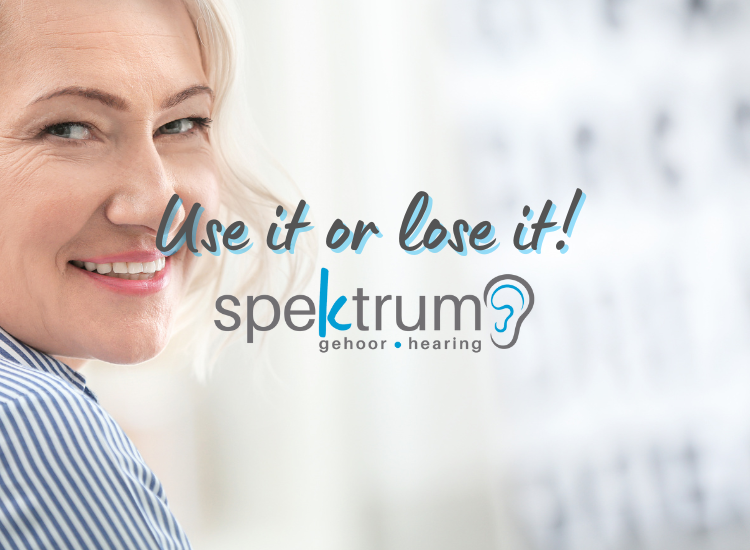If you don’t use it, you lose it they say…
Doesn’t this sound all too familiar:
Wife: ‘’You need to get your hearing tested!”
Husband: ‘’There is nothing wrong with my ears, you are the one that’s mumbling’
Years go by… and you visit your audiologist eventually because by now you are really struggling to hear… But then the audiologist informs you that hearing aids will only provide limited benefit because you have come too late. Yes. You can be too late.
This is so unfortunate
- You didn’t want to admit you have a hearing loss, because you might be regarded as OLD?
- You didn’t want it to be treated because people might see your hearing aid?
- People might think you are less intelligent for wearing hearing aids?
- It’s a sign of weakness?
- I hear what I want to hear?
- My hearing loss is normal for my age?
- My one ear is slightly down but the other is okay?
- Living with hearing loss is better than living with hearing aids?
I won’t even begin to elaborate on the misconceptions loaded in each of the above statements.
I totally get it, I completely understand that admitting to have and treating a hearing loss could be scary and unpleasant, but postponing this process is so severely detrimental to your well-being in the long run. Not only physically, but also emotionally and psychologically to name but a few…
From the audiologist’s point of view, the most detrimental consequence is the deterioration of the functioning of the ear, or more specifically, the auditory nerve / auditory cortex.
Did you know that if you do not use it, you lose it?
Why? When the hearing nerves and the areas of the brain responsible for hearing are deprived of sound, they atrophy – weaken – making recovery from hearing loss through mechanical means, aka a hearing aid, that much more difficult. The fancy term used by hearing professionals is auditory deprivation. The key to hearing better for longer is to keep the ear bits active and NOT let them atrophy. Through the use of hearing aids – early, when you first notice hearing loss, or are diagnosed with hearing loss – you’ll enjoy a better quality of hearing longer.
The most common cause of auditory deprivation is simple. The person with the hearing loss chooses not to treat their hearing loss with amplification – hearing aids. When no action is taken and the nerves of the hearing mechanism aren’t used, they become deprived of stimulation and slowly become weakened. No surprise here.
Another cause of auditory deprivation is single-ear hearing aid use. This asymmetrical setup causes one ear to take on more of the listening activity than the other, weakening the unaided ear over time. You maybe saved a few bucks by purchasing a single hearing aid rather than a pair, but you are depriving one ear from sound and causing the nerves on that ear to slowly weaken. Bottom line? Over time, that unaided ear is going to lose more and more functionality and when you do get around to buying a pair of hearing aids or adding a second hearing aid, that unaided ear will have a harder time adapting to sound.
There are several studies that indicate that the ear can recover from the effects of auditory deprivation, though other studies show that “resolution of auditory deprivation is generally significant but incomplete following binaural amplification,” or in other words, yes, things get better with a pair of hearing aids but the improvement is incomplete, meaning that the sooner you recognize hearing loss, the sooner you get treatment for hearing loss, the more success you will have with hearing aids and the better hearing you will have.
The solution? Keep your hearing nerves fresh and stimulated – don’t deprive them. See a hearing professional when you first suspect hearing loss. And, if you’ve suspected (or known) you have hearing loss, move your ears to a hearing professional instead of turning up the TV and radio.
Finally, a pair of hearing aids, regardless of your age, will improve your quality of life. Today’s hearing aids are lightweight, sleek, very discrete, powerful and packed with conveniences that make hearing fun again.
Hearing is one of the joys of life. The sooner you act when you suspect hearing loss, the better your hearing will be in the years ahead. So, come on, what are you waiting for? You know this is something that’s got to get done. Pick up the phone and call us today. There’s a better quality of life waiting on the other end of the line.
Think about this: When you struggle to see, you wear glasses…
Is it really so much different for your hearing?
